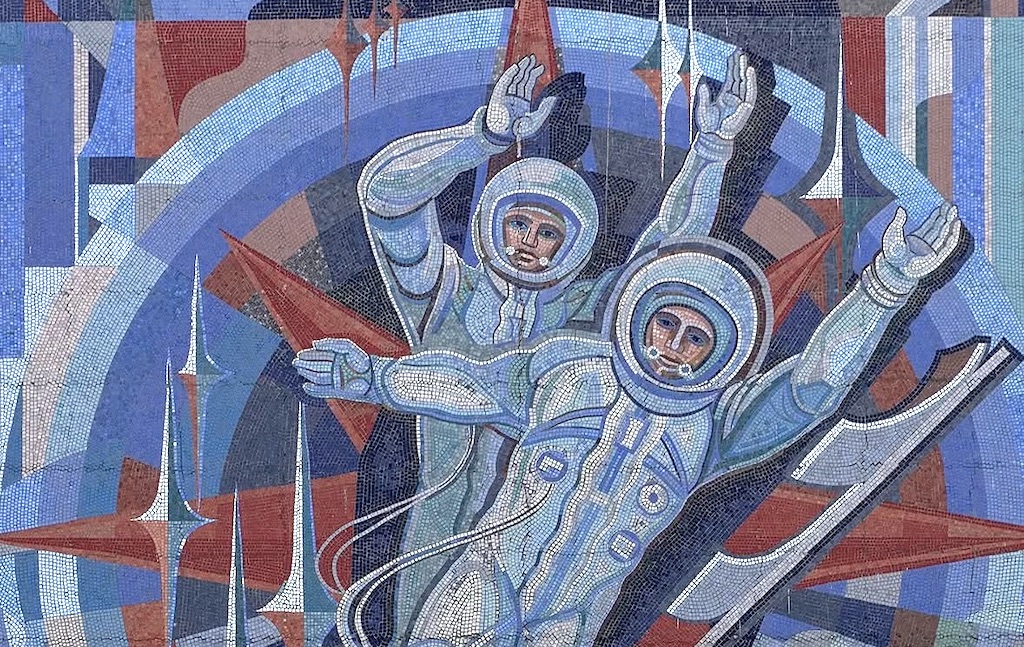In western Georgia’s Guria region, the village of Shukhuti begins with an unmarked turnoff that leads to a rough, winding road. At the end lies a fenced-off plot of land, guarded by Russian security personnel. They are protecting the site of what is slated to become a spaceport, or cosmodrome.
Plans are underway to build the checkpoint for the “Kolkhida” [Colchis was an ancient kingdom on the eastern coast of the Black Sea] cosmodrome – an initiative spearheaded by two Russian women, Yulia Guseinova and Maria Arkhipova. The pair arrived in Georgia from Russia around the onset of the war in Ukraine. By February, they had established two companies, acquired land, and started using part of it, drawing on their experience in the aerospace industry.
Both Yulia and Maria have roots in space technology. Maria (aka Maria Arkhipova-Bast) holds a master’s degree in public administration specialising in the space industry, earned at Moscow State University’s Faculty of Space Research. Her career includes coordinating the construction of the orbital station “Mir-2” and serving as chairperson of the Russian Consortium of Space Technologies, a private initiative launched in 2016 to advance commercial aerospace efforts.
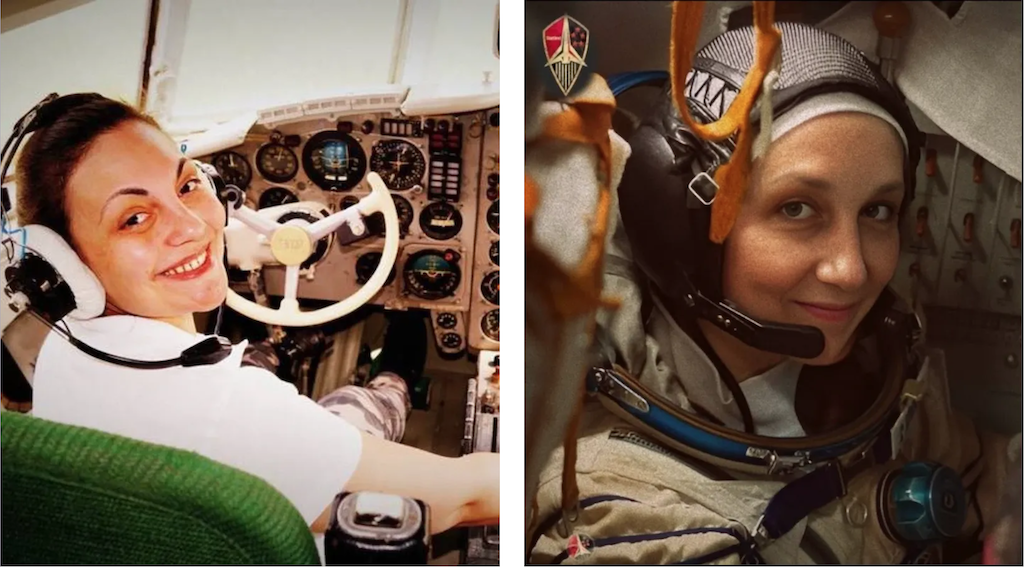
Maria, 46, and Yulia, 45, are known in Guria as sisters, although public records suggest otherwise. In truth, the two are long-time partners and, before Maria underwent a gender transition, were a married couple.
But the couple have kept more than just their personal history from the locals. Leaked documents reveal their regular communication with Russian state institutions. Among the trove: hundreds of emails and formal letters exchanged with Pravfond – a foundation established under Russia’s foreign ministry. The correspondence, dating back to 2014, was leaked from the foundation and obtained by the OCCRP, of which iFact is a member.
Blueprints for the stars
Videos promoting the “Kolkhida” spaceport reveal plans for a spacecraft launchpad and a facility for manufacturing drones and satellites. All are to be built on fenced-off land in the Lanchkhuti municipality of Guria. The videos even hint at ambitions to send people into space.
To realise these goals, the Arkhipovas’ company, Serviuk Agro, purchased three land parcels in Guria’s Lanchkhuti municipality – a total area of almost 14,000 square metres. These plots are intended as launch sites for orbital missions.
According to documents filed with Georgia’s Public Registry in 2023 by Yulia Arkhipova, the couple have begun laying the foundations: electrical systems and meters have been installed, an existing structure has been repaired, and sewer and water extensions have been laid. Vegetation has also been cleared. However, a close examination of the available photos and videos raises questions about the extent to which this infrastructure actually exists.
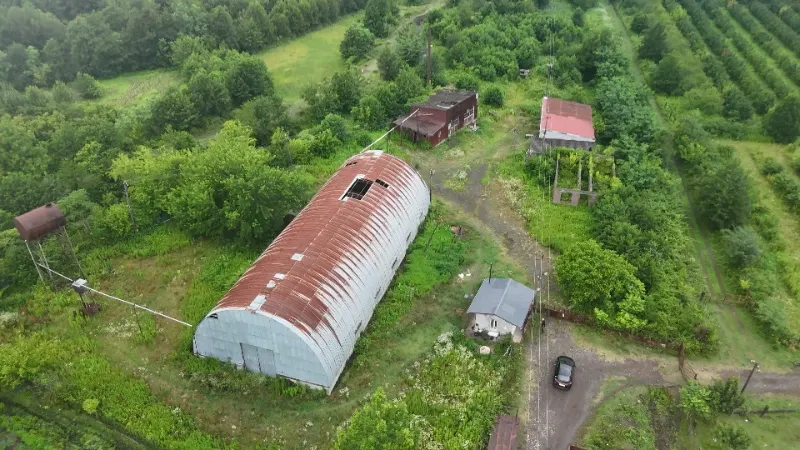
In reality, the Arkhipovas’ cosmodrome project is part of a broader, more complex story. On 27 August 2023, Maria Arkhipova sent a letter to Aleksandr Udaltsev, executive director of Pravfond, outlining the couple’s intention to build a space facility in Georgia. She wrote that Russian citizens were employed in leading roles and the cosmodrome could serve Russia’s needs as well as Georgia’s.
She also alleged that Yulia faced harassment and discrimination due to her nationality, including threats from citizens with nationalist leanings. Appeals to the Russian consulate, the Georgian ombudsman, the prosecutor’s office, and the police had brought no results, she claimed.
A day later, Yulia followed up with a second letter to Pravfond, including links to videos showing the site. The note detailed initial development plans: connecting electricity, paving access roads, and preparing supporting infrastructure.
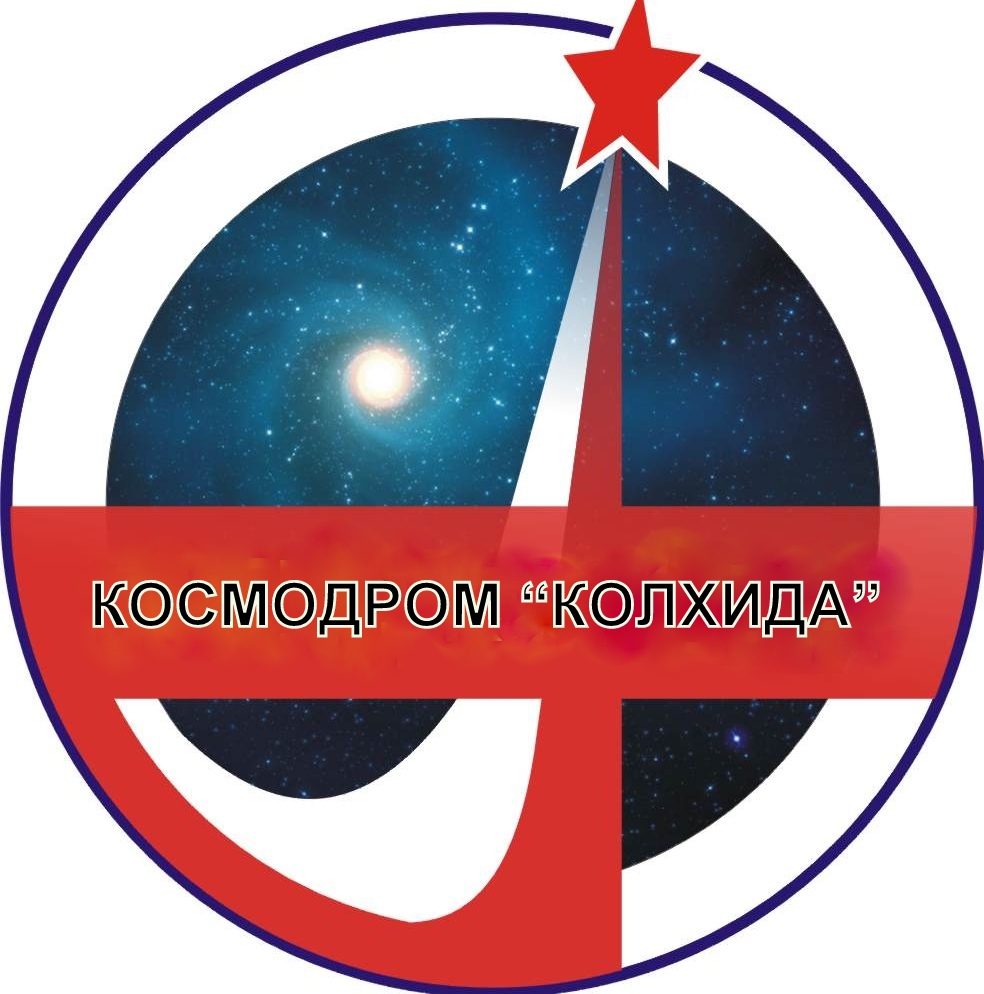
On August 30, the Arkhipovas sent yet another message, describing the situation as “direct persecution” based on Russian citizenship. “When a Russian citizen is openly called a ‘Russian fascist’ or an ‘occupier’ – if that’s not enough for the Russian Federation to defend its citizen, then I don’t know what is”, they wrote.
As of now, the "Kolkhida" spaceport project remains stalled. We asked the Arkhipovas why and what their next steps might be. They said construction has been paused at the project agreement stage and could be completed within a year if permitted.
We also contacted the Lanchkhuti Municipality to ask whether the Arkhipovas had submitted any permit requests. As of publication, we’ve received no official reply.
What is Pravfond?
The Foundation for the Protection and Support of Compatriots (also called Pravfond) was founded in 2012 by decree of Russia’s then-president, Dmitry Medvedev. Established by the Russian Ministry of Foreign Affairs in coordination with other state bodies, the fund’s official mission is to provide legal assistance to Russian citizens and diaspora communities abroad. In practice, however, Pravfond functions as a Kremlin tool of Russian soft power operating in Europe, Georgia, Moldova, Ukraine, and Central Asia. The organisation was sanctioned by both the United States and the European Union in 2023.
Pravfond finances legal defence for Russians abroad, runs informational campaigns, and offers diplomatic support through embassies and cultural centres. According to the intelligence services of Estonia and Latvia, it also operates as a tool of Russian intelligence, channelling funds into legal aid centres and pro-Russian Telegram channels in the region.
Among its high-profile actions, Pravfond covered legal fees totalling over €220,000 for Vladim Krasikov, a Russian Federal Security Service (FSB) operative who was convicted in Germany for the murder of Georgian national Zelimkhan Khangoshvili. Krasikov was sentenced to life in prison, but was released in a prisoner exchange in 2024 in return for two American journalists. Upon returning to Russia, he was personally greeted by President Vladimir Putin. Kremlin spokesperson Dmitry Peskov later confirmed that Krasikov had been an operative in the FSB's elite “Alpha” unit.
A joint investigation by OCCRP and Lithuanian public broadcaster LRT revealed that Pravfond has also funded Kremlin-aligned lawyers, propagandists, and intelligence agents across Europe.
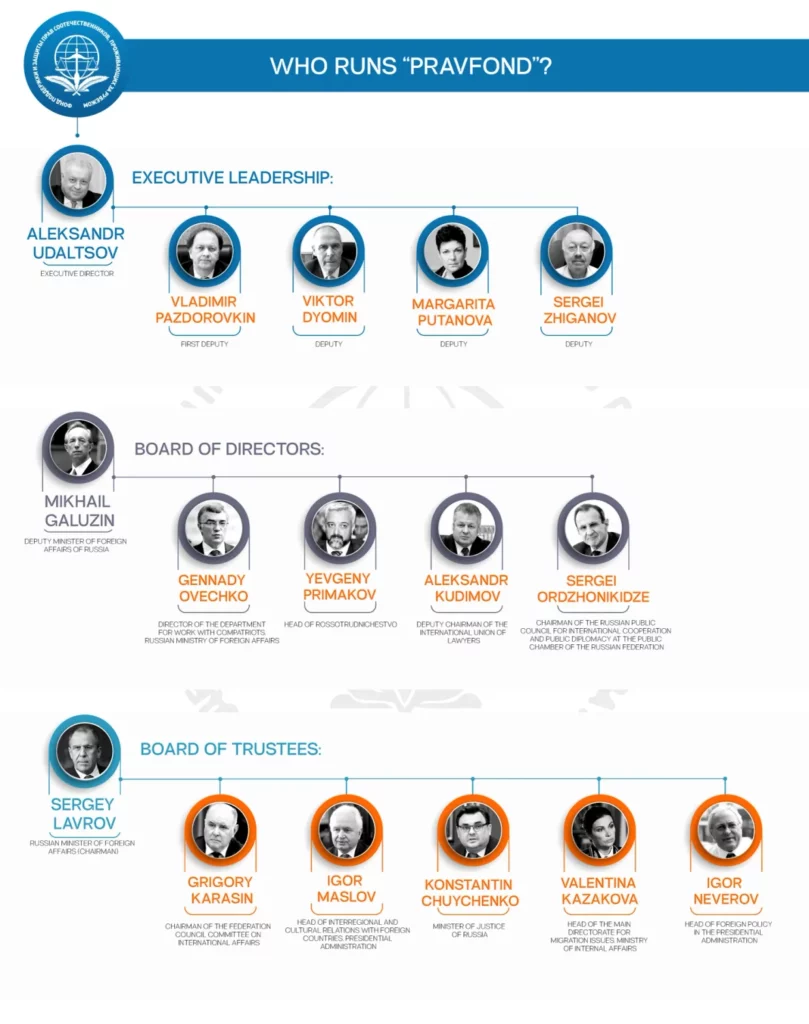
The Arkhipovas-Pravfond partnership
Maria and Yulia Arkhipova are closely connected to the Pravfond network. They have been collaborating with the Kremlin-linked foundation since around Russia’s annexation of Crimea, in 2014.
The Arkhipovas worked as human-rights lawyers in Russia. In the early 2000s, before Maria underwent gender transition, she founded an association for Russian attorneys called For Human Rights. This organisation was among several that petitioned President Vladimir Putin and Foreign Minister Sergey Lavrov in February 2023 to lift visa requirements for Georgian citizens. The Kremlin obliged a few months later, ending the visa regime with Georgia in May 2023. Internal correspondence suggests a clear rationale: Maria’s gender identity was seen as a public-relations asset.
As one Pravfond representative, Sergey Panteleev, put it: “Russia keeps producing reports and events for internal audiences, and they’re not taken seriously internationally. Hopefully, with help from [Maria and Yulia’s] organisation, we’ll finally find a way around this problem.”
At least €72,000 in grants flowed from Pravfond to the Arkhipovas’ Association of Russian lawyers for human rights (Ассоциация Адвокатов России за Права Человека). Officially, the funds supported reports on Ukraine and covered basic operational expenses. This figure reflects only confirmed contracts: the Arkhipovas have been in steady communication with Pravfond for over a decade, submitting reports, research, and opinions in exchange for guidance and support. It is likely their activities extended beyond these two documented projects.
In 2014, their association submitted a report on human-rights violations during the Russia-Ukraine conflict that echoed Kremlin narratives. It portrayed the Ukrainian government as neo-Nazi and characterised the Russian military's actions in Crimea as a protective measure for ethnic Russians.
That report was ultimately submitted to the United Nations. Pravfond’s Igor Panevkin praised their work in a letter after Maria’s report prompted the UN Committee Against Torture to send a delegation to Crimea.
The Arkhipovas, Russian assets in Georgia
In February 2023, the Arkhipovas wrote to Pravfond offering to bring their expertise to Georgia. “Given our experience since 2004,” they wrote, “we would be pleased if our knowledge and skills proved useful for on-site work – especially in Georgia, where we already have good connections with activists, politicians, and other stakeholders. [...] We are not opposed to working on creating a branch of a local NGO in Georgia.”
After that message, Maria and Yulia began to regularly update their Russian contacts on developments in Georgia. Pravfond forwarded these to Russian state agencies, including the Ministry of Education and the Presidential Administration.
In March 2023, Maria submitted a report claiming the existence of “Russian-speaking settlements” in Georgia, naming Grigoleti, Shekvetili, Ureki, and Poti. She alleged ethnic Russians there struggled with Georgian language barriers and faced bullying and, in some cases, violence. “They have no representation in elected positions… Russian names and origins lead to discrimination. People with Russian names are barred from jobs in administrative offices… They face more restrictions than Georgians. Typically, Russians are the first to be dismissed or laid off and are paid the lowest salaries”, she wrote. In the same report, she also advocated for Russian to be declared Georgia’s second official language, arguing that lack of interpreters in legal institutions leads to human-rights violations.
The tone and messaging of the Arkhipovas’ 2023 report on Russians in Georgia mirrors the rhetoric they used in 2014 during the annexation of Crimea, when they described Ukraine’s government as neo-Nazi and Russian military intervention as protective.
Maria has since echoed this rhetoric openly in Russian media, warning that if Russians’ rights continue to be violated, Russia may be forced to “take Georgia back,” just as it is “taking back Ukraine”.
From cosmodrome to jam factory
As Maria and Yulia Arkhipova settled near Lanchkhuti, they found a local ally in Gela Zoidze, a prominent figure in the region’s business community. He introduced the Arkhipovas to local entrepreneurs and became their business partner, holding shares in two companies alongside them.
Zoidze currently manages the Lanchkhuti Chamber of Commerce and Industry’s regional office. He previously headed the municipality-backed NPO “Lanchkhuti Municipality Center for Economic Development and Innovation”, which operated from 2009 until its closure in 2022.
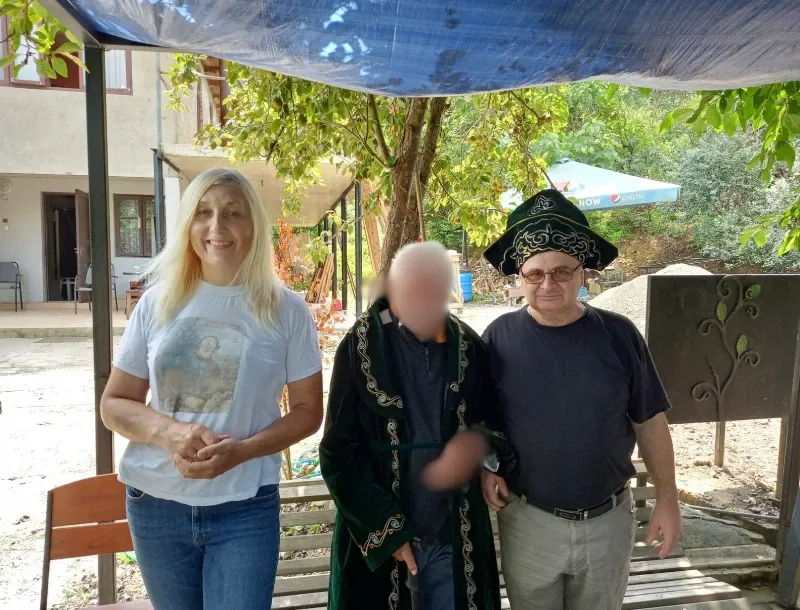
The Arkhipovas began operating in Georgia in early 2022. By June, they had set up four companies, including LLC Georgian Space Technologies. Zoize held shares in the other three. Among these, LLC Limoni owns more than half a hectare of land in Shukhuti and had previously exported preserves to Ukraine. Zoidze introduced the Arkhipovas to the Limoni owners in 2022. According to them, the Russians pledged to revive the factory with over two million lari (approximately €638,652).
Zoidze confirmed this, saying the deal hinged on preserving the facility. Restarting operations required “solid investment”, which justified involving the Arkhipovas. When asked if he was concerned about the origin of the money, he simply answered: “These people come to Georgia, they move around, cooperate with official structures – how was I supposed to check? I told someone from law enforcement about it – if there’s an issue, look into it.”
The factory that never came back
We met 85-year-old Tamaz Imnaishvili and 70-year-old Darejan Kalajishvili in Shukhuti on 29 June. They said they had been hopeful when the Russian investors arrived, believing their long-idle factory might finally reopen.
“We went to the notary, and a contract was drawn up. It stated that these Russians – Yulia Arkhipova and the other one – had 3,5 million dollars on their account. Of which, about 2,5 million was supposed to be invested in our factory”, Darejan recalled.

In exchange, the old owners transferred 51.55% of their shares: 49% to the Arkhipovas and 2.55% to Zoidze. The transaction was finalised in June 2022 at the office of Marina Jikia, a notary in Poti. Yulia Arkhipova was appointed as director.
This gave the Arkhipovas control of the land and buildings. But within months, the original owners grew suspicious: there were no signs of progress, and tensions flared. The new owners began blocking them from entering.
“I went there once, and they wouldn’t let me in”, Tamaz said. “When I finally did, seven Russians surrounded me and shouted, ‘Get out!’ One insulted my mother. I was so shaken I needed medical attention afterward.”
With no communication from the director and no activity, the old shareholders tried to remove Arkhipova, but their request was rejected by the Public Registry.
One year later, the Arkhipovas submitted a new document drastically shifting the terms. It claimed their “intellectual contribution” was worth 30 million dollars, serving as their input into the business. In return, the former owners were expected to grant Arkhipova complete control and agree not to interfere.
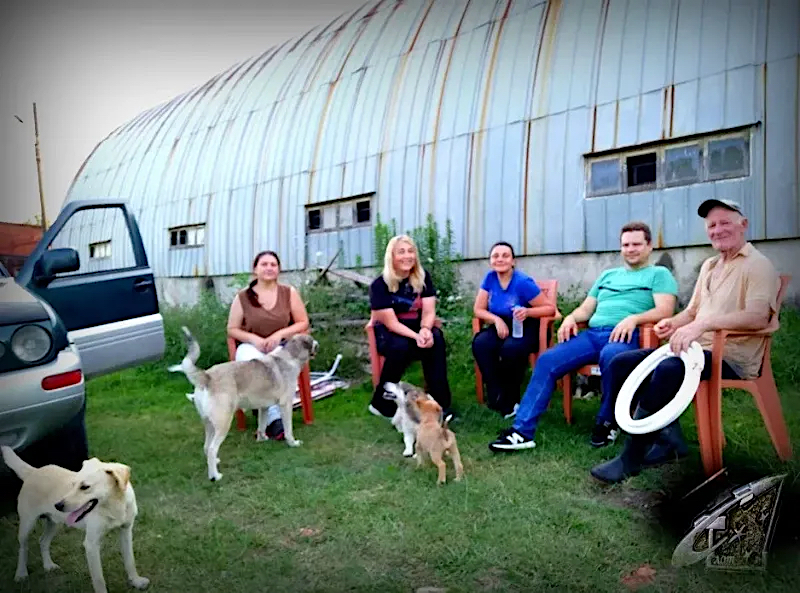
“That 2.5 million was supposed to go into production? It turns out Arkhipova’s brain was valued at 30 million dollars. What do I care about her brain?” Darejan said.
We asked Maria and Yulia if they considered their actions fraud. They denied wrongdoing, claiming they had entered the deal out of compassion for the elderly owners but suspended investment after “provocations”.
Since her appointment, Arkhipova has failed to fulfill her duties as director. The factory’s debts remain unpaid, the land is under lien, and no production has resumed – only the guard booth has been renovated. Russians brought in from Ukraine were hired as security and still live on the premises.
For two years, the original owners have tried to remove Arkhipova and reclaim their stake, filing complaints with prosecutors and courts. No hearing has been scheduled.
When we showed Tamaz and Darejan Maria’s YouTube videos describing the land as a future cosmodrome site, they were stunned. After a long pause, Darejan turned to Tamaz: “Where did you find these people, you blessed one?”
Where are the Arkhipovas now?
In May 2024, Maria Arkhipova shared some alarming news: her blood pressure had spiked, she had lost weight and was unable to sleep. She also believed that she had been poisoned. She continued posting about her health, saying doctors couldn’t diagnose her and that she was treating herself. She spoke of missing her hometown and friends in Russia. Meanwhile, Yulia contacted Pravfond, asking for help to return Maria to Russia for treatment, despite earlier claims of exile.
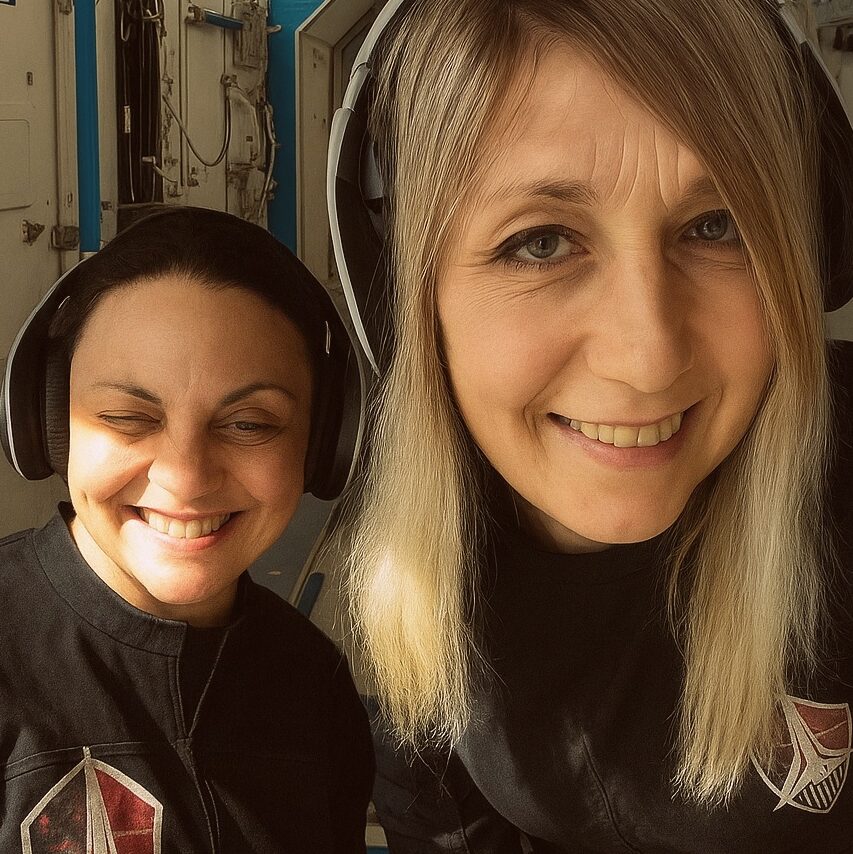
Their longtime contact Igor Panevkin responded with sympathy but said the now-sanctioned foundation couldn’t assist.
While details remain unclear, we confirmed Maria is undergoing treatment in France. Social media activity in fall 2024 also suggested time spent in Russia, particularly in Domodedovo (near Moscow).
In March 2023, the Arkhipovas told Pravfond they were defending Lali Moroshkina, a well-known pro-Russian scholar, in Georgia. They claimed that she had received threats as a result of appearing on Russian TV, and requested that Pravfond provide assistance. But when we contacted Moroshkina, she dismissed this: the women had introduced themselves at a café as exiled Russian lawyers, then later raised suspicion with their cosmodrome plans. She reported them to Georgia’s State Security Service (SUS).
“These women are either charlatans, spies, or fraudsters”, Moroshkina said.
The intermediary who introduced them was Dali (Mary) Milorava, a retired local who had briefly worked as their interpreter. She confirmed that Maria was now in France receiving treatment, and said that the police and security services had shown an interest in their activities.
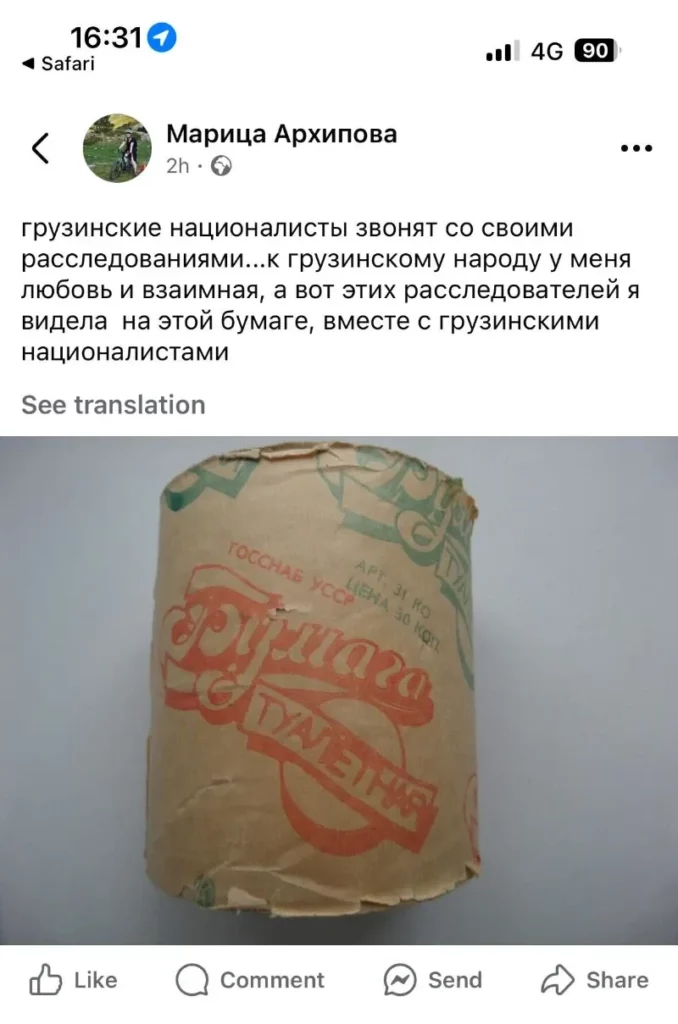
The Arkhipovas told us they have not left Georgia, claiming they were abroad only for health reasons. They acknowledged one meeting with the SUS, saying officials welcomed their “space” activities.
We tried for a week to confirm with SUS whether any investigation had been initiated, but received no response.
Our first direct contact with Maria and Yulia came on July 4 via WhatsApp, using a Russian number. They insisted Georgian journalists should speak Russian and sent us the alphabet. They refused direct answers, demanded written questions, and later mocked us on Facebook with a photo of toilet paper.
They threatened legal action if we published the article. We responded by stating that our work is based on verified documents and evidence.
Their final message: “А, ещё и запугивание. Понятно 🤣”. “Oh, and now intimidation too. Got it 🤣.”
Ia Asatiani, Eter Midelashvili, Natia Mikhelidze contributed to this article.
👉 Read the original article on iFact
Do you like our work?
Help multilingual European journalism to thrive, without ads or paywalls. Your one-off or regular support will keep our newsroom independent. Thank you!













